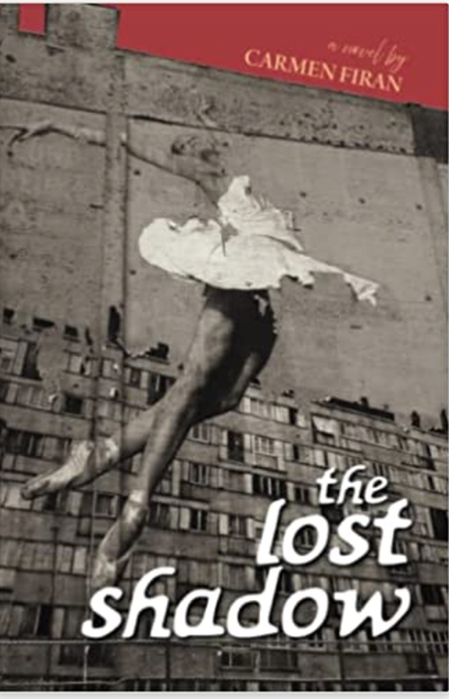The Lost Shadow
by
Carmen Firan
trans. Alexandra Carides
|
Review by Andrei Codrescu
What does “freedom of expression mean?” Fred is a writer who has fled from the guaranteed but conditional pedestal of his native police-state into what he believes is the freedom of the U.S. He can now write anything he wants without the censorship that shadowed his work in Eastern Europe. But in New York, the world that was going to be his oyster, becomes instead the infinite mirror of a paradox. In this mirror, he sees himself disappearing: he is free to write, but what? Here he is a book writer among many book writers, a user of heightened language in a world where language serves mostly the aims of commerce. His words, |
once miraculously weighty and possessed of the thrill and gravity of the forbidden are shrinking like snowflakes in a cup of hot tea. His young wife, Mimi, who has made it her mission to protect her genius-husband from the crude time-thieves of the police state, plunges eagerly into the new world. She must make a living to make time for Fred to write. She had once been his Pygmalion, shaped by him to absorb great ideas, and she is determined to repay that elevated education. This she does, but it is soon clear that roles have been reversed.
Mimi finds herself open to the dynamic speed of New York’s changing rhythms. For Fred time stands still as he insists on a grandeur that translates more into paralysis than creativity. When his book is finished at last he returns to what will be a triumph in his native country. His country has in the meantime overthrown the dictatorship and her citizens have joined the capitalist West, eager to experience its well-being and liberties. In the intellectual Bucharest he once escaped from in order to find freedom, he is received now with the same indifference that creative writers are met in New York. Few readers, few people at his book signing, editors who shrug and sigh at the state of affairs. They too, like their colleagues in the West, are looking for quick sellers. The literature Fred once worship belongs to another age. Back in New York, the metamorphosis is nearly complete: Mimi has become a butterfly, the poster child of a cosmetic industry built on images. Fred regresses or melts into his shadow. In the end, what remains from his heroic effort and their troubled marriage, is only the book. The book that no one wants to read. What is in this book? What kind of book is it? Mimi has not read it, but Fred has poured himself into it. The book remains a mystery.
In fact, Carmen Firan has written a grand mystery by delving deeply into the relationship between two people and two worlds. Her book is the mirror in which both Fred and Mimi see themselves reflected, shrinking and growing like the times they are destined to live in. She has written a great psychological and intellectual thriller of our day.
Mimi finds herself open to the dynamic speed of New York’s changing rhythms. For Fred time stands still as he insists on a grandeur that translates more into paralysis than creativity. When his book is finished at last he returns to what will be a triumph in his native country. His country has in the meantime overthrown the dictatorship and her citizens have joined the capitalist West, eager to experience its well-being and liberties. In the intellectual Bucharest he once escaped from in order to find freedom, he is received now with the same indifference that creative writers are met in New York. Few readers, few people at his book signing, editors who shrug and sigh at the state of affairs. They too, like their colleagues in the West, are looking for quick sellers. The literature Fred once worship belongs to another age. Back in New York, the metamorphosis is nearly complete: Mimi has become a butterfly, the poster child of a cosmetic industry built on images. Fred regresses or melts into his shadow. In the end, what remains from his heroic effort and their troubled marriage, is only the book. The book that no one wants to read. What is in this book? What kind of book is it? Mimi has not read it, but Fred has poured himself into it. The book remains a mystery.
In fact, Carmen Firan has written a grand mystery by delving deeply into the relationship between two people and two worlds. Her book is the mirror in which both Fred and Mimi see themselves reflected, shrinking and growing like the times they are destined to live in. She has written a great psychological and intellectual thriller of our day.

